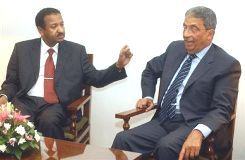Sudan seeks support from Arab League emergency meeting on Darfur crisis
By NADIA ABOU EL-MAGD, Associated Press Writer
CAIRO, Egypt, Aug 08, 2004 (AP) — Human Rights Watch called on Arab League foreign ministers meeting in an emergency session in Cairo Sunday to “stand behind the victims” in the Sudanese region of Darfur, where Arab militias purportedly backed by the government are accused of killing thousands of African villagers, forcing many more to flee, and creating an escalating humanitarian disaster.
 The 22-member Arab League, though, rarely criticizes one of its own and has opposed tough international action against Sudan. Sudan’s government, which called for the Cairo meeting, has insisted fellow members of the Arab League stand with it, pointing to the U.S.-led invasion of Iraq that already has angered many Arabs and accusing the West of using Darfur as an excuse to intervene in the region again.
The 22-member Arab League, though, rarely criticizes one of its own and has opposed tough international action against Sudan. Sudan’s government, which called for the Cairo meeting, has insisted fellow members of the Arab League stand with it, pointing to the U.S.-led invasion of Iraq that already has angered many Arabs and accusing the West of using Darfur as an excuse to intervene in the region again.
“We are looking for clear decisions from the Arab League to support the efforts aimed at solving the Darfur crisis, keep away a possible foreign intervention and maintain Sudan’s territorial integrity,” Sudanese Foreign Minister Mustafa Osman Ismail said on arrival in Cairo early Sunday.
“We are looking forward to political support from the Arab group to check any attempt to target Sudan or impose sanctions on it,” Ismail said, adding he hoped the league would urge the international community to offer more aid to Sudan.
Human Rights Watch, in a statement Saturday from its Africa division chief Peter Takirambudde, said Sudan was “trying to manipulate opinion in the Arab world to hide the massive crimes it has committed against Sudanese citizens.”
“Allowing the Sudanese government to hide its crimes behind Arab solidarity would be an insult to more than 1 million Muslim victims in Dafur,” Takirambudde said. “The Arab League should stand behind the victims in Darfur and take concrete steps to ensure that civilians are protected from further crimes.”
The Arab League opposes sanctions against Sudan, as does Arab opinion-leader Egypt, which takes a special interest in neighboring Sudan and has called for Khartoum to be given more time to resolve the crisis on its own.
An Arab League fact-finding team that visited Darfur in May concluded that alliances between Arab militia and the Sudanese government troops led to “the militia committing violations of human rights.” The team called for an independent investigation, but its findings and recommendations were not widely circulated.
The United States pushed for a recent U.N. resolution that indirectly threatens sanctions against the Sudanese government if it doesn’t rein in Arab militias known as Janjaweed accused of killing thousands in Darfur.
The U.S. Congress and some humanitarian groups have accused Sudan of genocide in Darfur. In a human rights report last week, Asma Jahangir, the U.N. investigator on executions, blamed the Sudanese government for atrocities against its civilians in Darfur. Jahangir said there was “overwhelming evidence” killings in Darfur were carried out “in a coordinated manner by the armed forces of the government and government-backed militias.”
Ethnic African villagers who subsist on farming have long clashed over scarce resources with ethnic Arab herders in Darfur, a neglected region of western Sudan. African groups declared a rebellion in February 2003 over what they regard as unjust treatment by the government. The government is accused of using the Janjaweed to put down the rebellion.
The Darfur violence is unrelated to a longer-standing rebellion in southern Sudan that the Sudanese government also has portrayed as an attempt by outsiders to dismember an Arab country.
The Arab-dominated Sudanese government denies it backs the Janjaweed and says it needs more time and help to carry out agreements with the United Nations and the African Union to disarm rebel groups and improve the humanitarian situation in Darfur.
At the United Nations Friday, U.N. spokesman Fred Eckhard said Ismail and Jan Pronk , U.N. special representative in Khartoum, will sign on Monday a new agreement that requires the government to create safe areas for civilians in Darfur within 30 days.
Asked upon arrival in Cairo about reports that Sudan has agreed to share power with the Darfur rebels, Ismail said a political solution was possible on the same principles of preliminary power and wealth sharing agreements signed with the Sudanese southern rebels.
